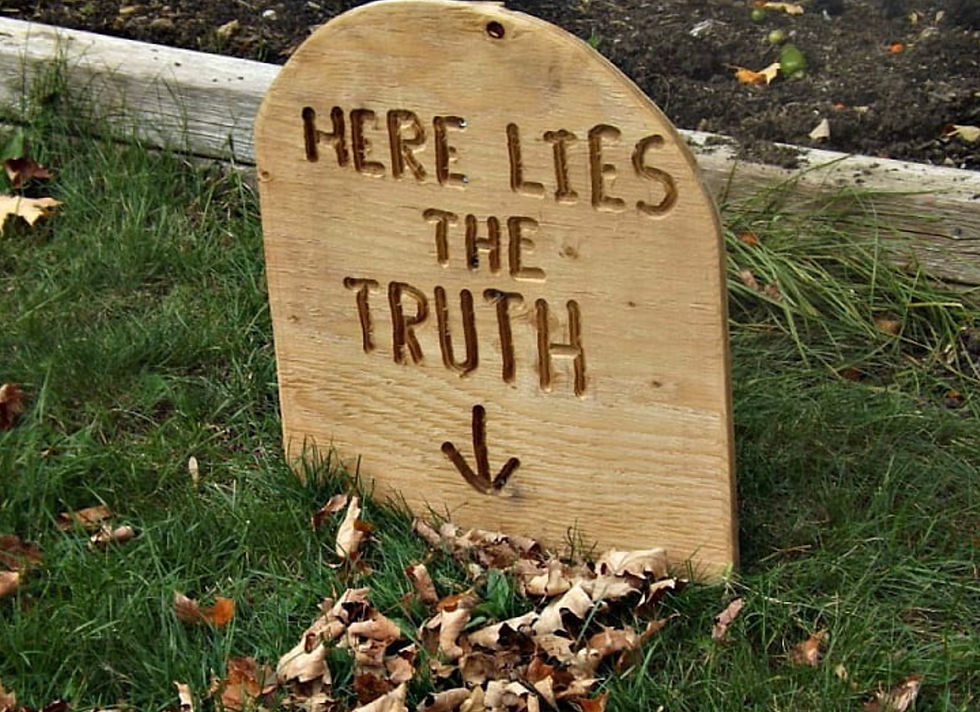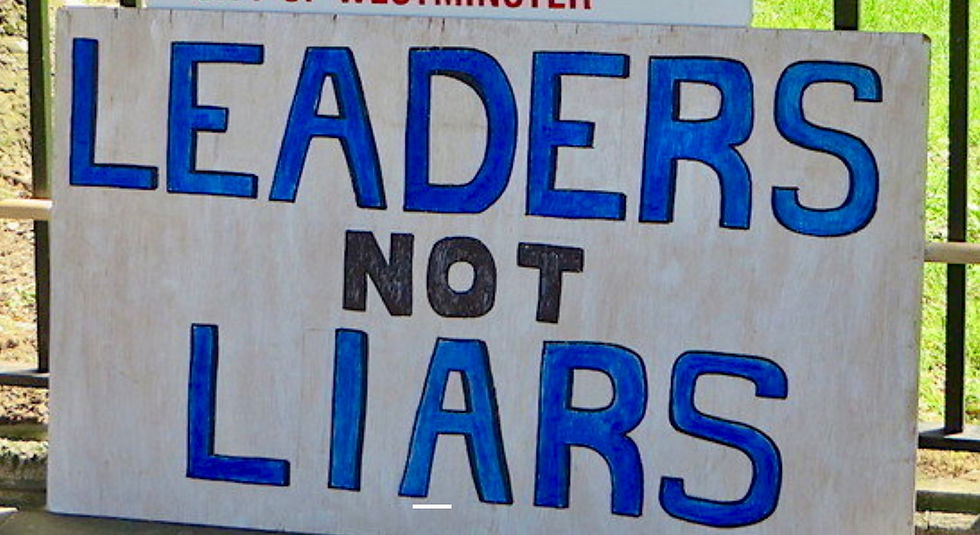Political lying is out of control
- Jan Dehn

- Sep 27, 2025
- 9 min read
Updated: Sep 28, 2025

Lying in Western politics has recently assumed unprecedented scale and severity. As I type these words, the ground is shifting as far as political morals are concerned. Lying has gone into overdrive, led by Far-Right populists such as Donald Trump.
It is difficult to exaggerate the scale of the problem. Many others have done a stellar job exposing Trump’s false and misleading statements, so there is no need for me to do the same. Still, allow me to impart the flavour of what we are talking about by reproducing the opening paragraph of Wikipedia’s summary on the topic (my emphasis in bold):
“During and between his terms as President of the United States, Donald Trump has made tens of thousands of false or misleading claims. Fact-checkers at The Washington Post documented 30,573 false or misleading claims during his first presidential term, an average of 21 per day…. Commentators and fact-checkers have described Trump's lying as unprecedented in American politics, and the consistency of falsehoods as a distinctive part of his business and political identities. Scholarly analysis of Trump's X posts found significant evidence of an intent to deceive.”
(Source: here)
Trump’s entire business and political career has been built on deceiving people. Unfortunately, Trump is now the president of the United States, which gives him the highest-profile platform in the world from which to spread lies. His falsehoods are literally soiling politics on a global scale.

To make matters worse, Trump’s lies are not of the innocent kind. They erode trust in science, encourage the spread of disease, undermine economic progress, scapegoat the most vulnerable in society, subvert democracy, make a mockery of human rights, call into question the rule of law, and stir up tension between nation states. Trump’s lies, much like those of Joseph Goebbels, Hitler’s propaganda minister, are told in the service of fascism, which makes them extremely dangerous.
Granted, politicians have always lied, so why be more concerned now? It is true that lying has been a constant feature in Western politics as long as democracy has existed, so much so, in fact, that most voters take it as given that some politicians will obfuscate, confuse, evade, deceive, or just plainly lie, at least some of the time.
For example, we are all familiar with politicians, who blame their failures to deliver on election promises on exogenous shocks, such as geopolitical events or unexpected turns of the business cycle. This is exactly what Winston Churchill meant when he said, “Never let a good crisis go to waste”. Exogenous shocks are so useful that politicians even invent their own, say, by picking fights with foreign powers or by sowing internal division along cultural lines.
We are also familiar with the clever way politicians feed the news agenda to make us forget their election promises. Election commitments are only made every four or five years. By contrast, the news cycle lasts a few days or weeks, so it is extremely easy to make election promises slip from public view by constantly feeding journalists all kinds of intrigue.
These practices are damaging for democracy, but voters are relatively accustomed to them, so, presumably, discount them to some extent, although we should not rule out that some voters still put politicians on a pedestal, a legacy, perhaps, of feudal times, when those in power could get away with just about anything.
What we are seeing emerge from Far-Right populism today, however, is a completely different ball game. We are seeing manipulation and deception of voters on a scale which is unprecedented in terms of frequency and severity. To make matters worse, the intensification of mendacity coincides with two other developments which have massively increased the damage.
The first development is that control of large sections of the news media is now in the hands of people, whose interests are closely aligned with those of Far-Right populist politicians. The CEOs of X, Instagram, and, now, TikTok are all close to Trump. So are the owners of traditional media outlets, such as Fox, Sky, The Telegraph, The Times, and Washington Post. Even BBC, once known for political neutrality, has fallen under Far-Right control. Dominant news outlets today do very little in the way of informing and educating. Instead, they entertain a great deal, but most of all they spread misinform and mis-educate voters, thereby directly assisting the Far-Right in its political agenda.
The other development that massively worsens the impact of lying in politics is that Western societies are more polarised than in many decades. Rising inequality means that more and more voters at lower end of the income scale feel marginalised and abandoned by mainstream politicians, to the point where they simply not to listen them, let alone vote for them.
Political antagonists now inhabit separate echo chambers with no mutual trust, no mutual respect, and frequently no direct communications either. There is simply no point in one side pointing out the political lies of the other side, because no one is listening. Mistrust runs so deep that even facts backed by solid scientific evidence, if put forward by the ‘wrong side’, are often dismissed outright. As the set of ‘objective facts’ shrinks at an unprecedented rate, the populists on the Far-Right gain ever more room to plant new lies.
But, I hear you object, what about voting? We still have elections! Won’t the liars and the charlatans eventually be exposed and then flushed out at the next election? Unfortunately, this does not appear to be the case. Trump is a prime example. Trump returned to power despite his failure to deliver on countless election promises in his first term, despite repeatedly lying, despite convictions for multiple crimes including rape, and despite his attempt to over-turn democracy itself.
Western democracy is broken. While it has never been perfect, the rise of Far-Right populism is now making it abundantly clear that something must be done. But what? Democrats and whole swathes of the Left and Centre of politics in the West do not appear to have any answers, having seemingly lost all vision and confidence, like a deer in the headlights.

My view is that politicians lie and deceive because they can. We allow them to. Some countries even grant their members of parliament immunity from prosecution. The US Supreme Court recently ruled that Donald Trump cannot be prosecuted for actions he takes as president.
It is astonishing, if you think about it, that we allow our politician, who after all are the most powerful people in our societies, so much room to do what they please. The laxity we afford our politicians is sharply at odds with the well-defined rules by which the rest of us must operate.
At its core, the problem is that our voting system confers powers onto voters to select their politicians, but it does NOT create a binding link between politicians and their election promises.
From the perspective of voters, this means that the democratic system works a bit like a car in which the steering wheel is not connected to the wheels, so when voters turn the steering wheel (cast a vote) there is no guarantee that the wheels will respond accordingly (policies change).
The way to solve this problem is to make election commitments legally binding. Until this happens, politicians can and will wiggle out of election commitments with astonishing ease. We must force politicians to deliver on what they promise, force them to act with the same integrity we expect in other spheres of life. The risk of not delivering on election promises must be borne by politicians, not by voters.
The way to force politicians to behave is to transform the act of voting from today’s non-binding expression of wish to a legally binding contract between politicians and their election promises. The terms of the contract must include substantial rewards for politicians, who deliver on their promises, but also significant punishment for those who do not.
Rewards could take the form of cash bonuses, pension contributions, or other types of remuneration, while punishments should be fines, or, in particularly gratuitous cases of breach of trust, prison sentences.
Voters will know exactly what each politician stands for, because his or her election commitments will be listed on the ballot paper opposite the name and party affiliation of the candidate.
Politicians must obviously be free to choose their own election commitments, but the commitments become legally binding the moment the politician is elected.
Legally binding election commitments would completely transform Western politics, doing away with the dangerous populism we are experiencing now.
The new type of politics under reformed incentives would be characterised by:
· Far more realistic campaigning as over-promising is replaced by realistic and achievable election commitments.
· A laser-like focus on post-election delivery in place of the obfuscation, confrontation, blame-shifting, exploitation of exogenous shocks, scapegoating, and other manipulative practices that politicians use these days to avoid accountability.
· Greater political co-operation as politicians are strongly incentivised to form coalitions prior to elections rather than afterwards in order to reduce post-election delivery risk.
Legally binding election commitments would usher in an entirely new class of politician. Large bonuses – similar to what, say, senior bankers make – will encourage participation from highly competent, risk-loving technocrats, who will run for office on ambitious but achievable platforms.
Meanwhile, the current crop of immoral and incompetent charlatan politicians will either choose not to run at all, or, if they do run, do so facing a very high risk of going to jail on account of their ineptitude.
Even without the charlatans, however, there will still be plenty of choice for voters, because the new crop of politicians will of course have different visions for how they want society to be. The point of the reform, clearly, is not to stamp out political visions, but rather to make sure whatever is offered to voters is then actually delivered.
Society as a whole will benefit enormously from democracy reform. Delivery on election commitments will improve sharply, resulting in reforms actually being implemented rather than merely being talked bout. The ‘missing link’ between the steering wheel (voting) and the wheels (actual policies) will therefore finally have been found. In turn, this should reduce voter apathy and push up voter participation rates.
Government waste and white elephant projects also drop off sharply, unless, of course, voters demand such projects. The economy should also become more stable, because politicians no longer create ‘exogenous’ shocks to divert attention away from their own failures. Politicians who are afraid that exogenous shocks might prevent them for fulfilling their promises have no choice but to tone down their election commitments, since it is they and not voters who now bear the risk of non-delivery on election commitments.
______
Now, it takes no genius to see that politicians, parts of the media, and even some sections of voters might strongly object to this kind of reform. It is worth remembering, however, that similarly ambitious reforms, such as the abolition of slavery, women’s suffrage, and the introduction of the welfare state faced very similar obstacles. Major reforms always begin at grass roots level. Eventually, reform-minded politicians pick up the baton and finally laws and institutions are changed. This is how progress has always been achieved in the West and democratic reform will be no different.
The process starts with building broad popular support for change within civil society and then graduating to formal institutional change at government level as soon as parliamentary votes are there in favour of reform.
To help push things along, a system can be put in place to monitor the performance of all elected officials with respect to their election commitments. A non-government organisation with no ties to government would be suitable. It would collect information on the election promises made by every politician running for office and then track politicians’ performances with respect to their election commitments throughout the subsequent term in office.
Each politicians is individually assessed and scored based on his or her performance and rankings should be published in league tables with the best performing politicians at the top and the worst at the bottom.
Performance league tables will be powerful for two reasons. First, they will keep politicians’ promises in the public eye and thereby enable voters to monitor on an ongoing basis how their elected officials are performing in office. Second, league tables increase political competition by giving aspiring candidates ammunition to attack useless incumbents.
Everyone wins. Except useless politicians.
Once the benefits of monitoring political performance become more widely appreciated, we will see the emergence of a new crop of politicians, who buy into democratic reform. As they get elected in greater numbers, eventually they will have enough votes to introduce root and branch change in the democratic system.
A key addition to current institutional framework should be a formal Ombudsman with responsibility for democratic accountability.
The Ombudsman, who is independent of other branches of government and receives statutory funding, will be tasked with the introduction of legally binding ballots as well as administering punishments and rewards for politicians based on their performances.
The Ombudsman should also be mandated to investigate complaints, issue recommendations, and instigate legal action, if and when required.
–––––
As far as I know, no one has proposed this type of democratic reform before. Action is urgently required. The dire state of politics in the West is no longer just holding us back; it is threatening democracy itself and the hard-won prosperity we enjoy.
Before political lying spins completely out of control, it is therefore imperative that all supporters of Democracy congregate around a vision not just for how to unseat autocrats, but also for strengthen democracy to prevent their return. The reforms I have outlined here would shift significant powers from politicians to voters; politicians might finally become true public servants.
The End




Comments